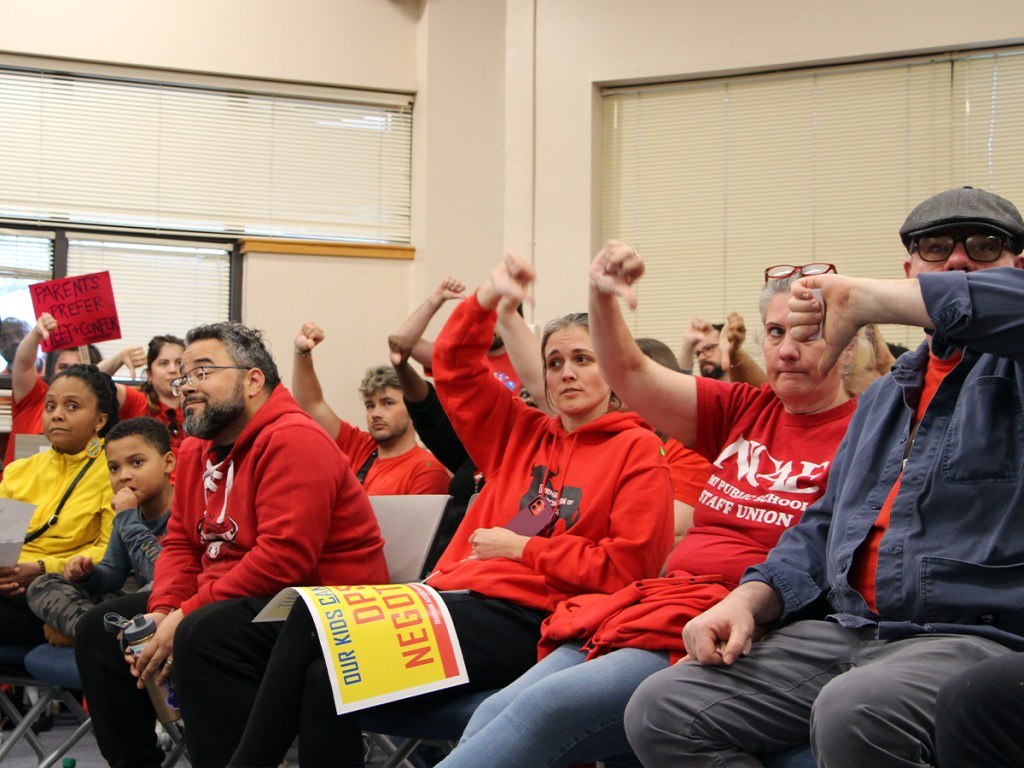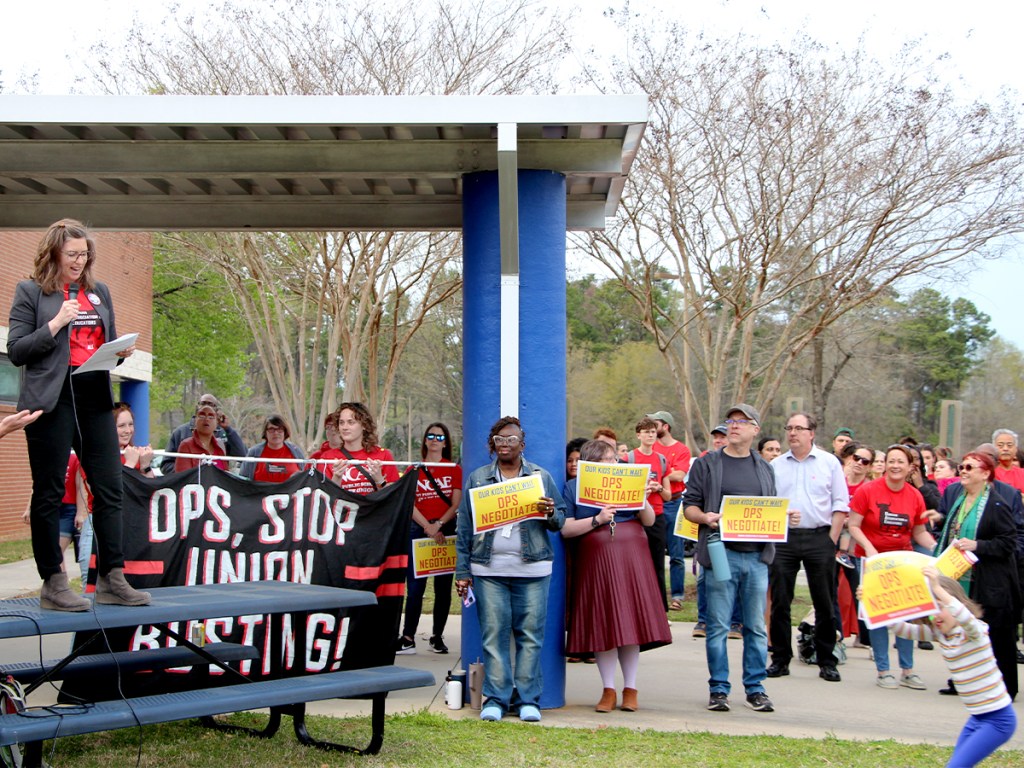At a Tuesday meeting with the Durham Association of Educators, Durham Public Schools Superintendent Anthony Lewis walked in to applause and left, about 20 minutes later, to hisses and jeers.
“Dr. Lewis,” said DAE president Mika Twietmeyer, cutting off the superintendent’s long and conciliatory opening statement. “Are you ready to talk about why you don’t want to accept DAE’s proposal tonight?”
The public meeting, which required Lewis to mount a one-man defense against a room packed with over 100 red-shirted DAE members and supporters, was an aggressive push by the group to try to get a union-like meet and confer policy passed in time for the DAE to weigh in on this spring’s ongoing budget process. But the high theatrics at the staff development center didn’t seem to bring the two sides any closer to an agreement.
Sitting across from Twietmeyer and other elected DAE representatives, Lewis pointed out the same sticking points—the legality of the agreement and requirements around who he is allowed to bring to the meeting table—that the teams have haggled over since December.
“If we can come back to the table with our attorneys to hash that out, I think we can have a policy that we’re ready to take to our board,” said Lewis.
Lewis’s legality concern is really the core of the meet and confer agreement. North Carolina and South Carolina are the only states in the country that still expressly ban all public sector employees from collective bargaining. Meet and confer is supposed to give workers more input on district decisions without breaking the North Carolina statute that outlaws “any agreement, or contract, between the governing authority…and any labor union, trade union, or labor organization, as bargaining agent for any public employees.” Lewis is also trying to tap dance around a statute that forbids the board from giving preferential treatment to any particular employee organization.
The school board, and its lawyers, should be ready to defend any potential policy against those unforgiving statutes.
Although both Lewis and Twietmeyer are pushing for a final policy draft, on Tuesday they couldn’t even agree on whether or not Lewis RSVP’d to the meeting. In a pre-meeting press release, the DAE said that “Dr. Lewis originally RSVP’d yes to the public meeting, but he has since said he has not decided whether or not he will attend.” The superintendent objected to that, telling the crowd that “I did not RSVP. I wasn’t supposed to be here tonight. However, I recognize that the individuals in this room are charged with taking care of some 31,000 students in this district, and I owe it to you to be here.”

Perhaps drawing on their years of classroom experience, DAE leaders tried to keep their crowd in check, telling members to give a “thumbs down” instead of shouting out their disapproval. That didn’t stop a pretty steady stream of angry murmurs throughout the conversation, and a shout of “bullcrap” when Lewis left early, saying he needed to pick up his daughter (who is a student in the district).
Afterwards, Twietmeyer told a media scrum that the union had other targets in mind besides the superintendent.
“Our outcome tonight was also hoping that we could encourage one more board member to vote in favor of our policy. We know that Dr Lewis is hesitant, and he’s been hesitant for a while, and he clearly showed that publicly this evening.”
Two school board members, Jessica Carda-Auten and Emily Chávez, spoke at the pre-meeting rally in support of the DAE’s current meet and confer draft. Board member Joy Harrell-Goff was also listed on the press release, but did not make a speech.
“I do see meet and confer as a way to share power,” said Chávez, addressing the crowd from a picnic table. “But I also want to note that the school board retains its power through this policy as well. And I think that in a county of over 300,000 people with almost 32,000 students, having just seven individuals who serve on the board necessitates that we have demonstrated and effective ways of collecting input from our community.”
The superintendent is directly accountable to that seven member board—or at least, to any majority of it that can agree on a vote. In September, the board directed Lewis to work with DAE leadership to develop a policy for the board to then review. That puts Lewis in a difficult situation when three of his supervisors are now publicly pushing him to agree to a policy that he is not prepared to implement. The other four have said they support meet and confer, but have left it to the superintendent to negotiate.

When Twietmeyer, at the pre-meeting rally, said that “we only need one more vote to make this policy a reality,” most of the crowd responded with a “one more vote!” chant, but one cluster of educators quickly turned that into a quieter “Nat-a-lie!” on the same rhythm. That seemed to be a call to board member Natalie Beyer, who stood on the outskirts of the crowd.
The day after the meeting, board chair Millicent Rogers wondered what it would do to the board-superintendent relationship if a majority of the board suddenly decided to publicly buck Lewis from the negotiations that he had led for six months.
“Every group needs a leader, and Lewis was hired to be the leader of the employees of Durham public schools, so without him there’s nobody for [the DAE] to sit at the table with,” Rogers told INDY. “Shifting on two days’ notice would be a surprise for the superintendent, and one that I’m not sure the district could endure if the superintendent decided that this kind of surprise was too much for him and he needed to find somewhere else to go.”
The DAE has pitched itself as a solution to the constant stream of DPS crises in recent years (see: paychecks, transportation, budget shortfall), and has used each successive crisis to grow its membership numbers beyond the 50 percent threshold. The union has also been emboldened by a recent win in Asheville City Schools, where the superintendent recently adopted what that district is calling a meet, confer, and collaborate procedure.
Lewis and Rogers have pointed out the difference between a procedure, which is a move the superintendent can unilaterally make (and thus unilaterally unmake), and a policy, which would empower the board to compel the superintendent to meet with the union. (“I want to be very clear that this is a procedure and not a policy,” an Asheville City Schools spokesperson said in an email to INDY).
Asheville’s procedure would require the association to maintain majority membership among employees in order to maintain its access. DAE’s draft, in an effort to not “give an education employee association preferential treatment through procedures, policies, or any other means” (as, of course, banned by state law), would allow any employee representative organization (ERO) with as little as 6 percent recognition to qualify for a proportional amount of separate meet and confer sessions.
A meet and confer update is not on the board’s agenda for Thursday, but DAE leaders are scheduled to hold a press conference outside the administrative building. Rogers says that even if Lewis does soon decide that a policy is ready for approval, the board is unlikely to accept it without careful review.
“We were elected to make tough decisions for the district, and choosing to enter into a collaborative conversation by policy with one ERO puts the district in a precarious situation that we were also elected to protect the district from,” says Rogers. “We are really excited to pass a meet and confer policy that prioritizes workers’ rights and teachers’ rights, and look forward to getting something that is legal in front of the board soon.”
Support independent local journalism. Join the INDY Press Club to help us keep fearless watchdog reporting and essential arts and culture coverage viable in the Triangle.
Reach Reporter Chase Pellegrini de Paur at [email protected]. Comment on this story at [email protected].
